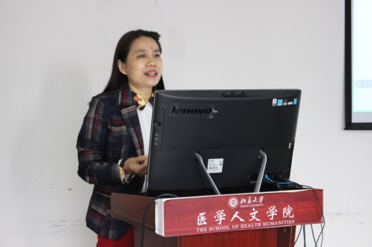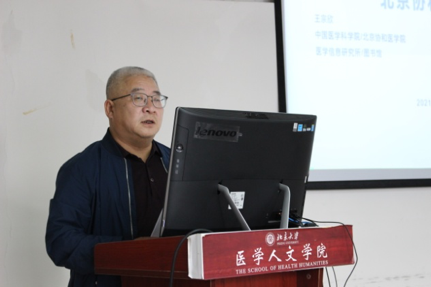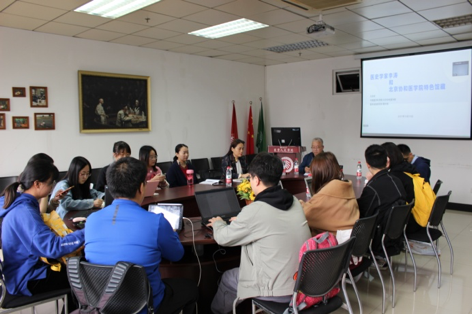The 88th Peking University Medical Humanities Forum:Medical Historian Li Tao and the Special Collections of the Peking Union Medical College Library ——Commemorating the 120th Anniversary of Professor Li Tao's Birth
On October 15, 2021, the 88th Medical Humanities Lecture was hosted by the Medical Historical Data Collection and Research Center of the School of Medical Humanities of PKU. Zhen Cheng, professor of the School of Medical Humanities and director of the Medical Historical Data Collection and Research Center, presided over this lecture.

Wang Zongxin, a research librarian from the Peking Union Medical College(PUMC) Library, was invited to give a lecture on “Medical Historian-Li Tao and the Special Collections of the Peking Union Medical College Library”. This lecture uses a combination of online and offline methods, and more than 80 people participated in this academic activity.
2021 is an ordinary year, the Communist Party of China celebrates its 100th birthday, also it is the 120th birthday of Professor Li Tao. Li Tao was one of the founders of the discipline of medical history in China, and made great contribution to the establishment of medical history in Peking University Health Science Center. He has done pioneering work in the collection of medical history literature, medical history research, medical literature publishing, and library science. Wang Zongxin introduced the life and academic contributions of Li Tao based on the rich library resource of PUMC.

First of all, Wang Zongxin introduced Li Tao's life-time achievement and the early development of the discipline of Chinese medical history. Under the charge of Li Tao and Wang Jimin, the Medical History Society of Chinese Medical Association united many experts in the field of Chinese and Western medicine, which made outstanding contributions to the research on the history of Chinese and Western medicine. Then, Wang Zongxin displayed the works of Li Tao in the library of the Union Medical College. -"Compendium of Medical History(医学史纲)." In 1936, after reading "Man and Medicine", Li Tao wrote a book review of more than 10,000 words in order to introduce the concept of Western medicine to the public. In addition, Li Tao collected a large amount of medical history documents in Beijing Library, Peking University Library, the library of Beijing Medical College and the library of the Chinese Academy of Sciences, etc., from which he accumulated materials and experience for his later compilation of the "National TCM Books Joint Catalog". Li Tao founded the "Medical Literature Abstract" magazine to conduct medical academic exchanges.
The second part of the conference was the special collections of the Peking Union Medical College Library. First, Wang Zongxin gave a brief introduction to the library of Union Medical College. The collected books are mainly biology and medical books, especially foreign periodicals. The library of Union Medical College has more than 10 languages and more than 5000 original editions. The number of medical history special collections are more than 800. Among them, the "Catalog of Medical History in the Collection" includes classic books, annual reports, and PUMC publications. Wang Zongxin focused on the precious collection of books donated by Lijun and Li Shudong to the PUUMC Library. Li Jun was a well-known clinical physician in late Qing Dynasty, as well as a scholar and bibliophile with extensive knowledge. He was diligent in writing and has accumulated a wealth of medical records. His son Li Shudong donated part of the precious books to the library of Union Medical College and became One of the most precious special collections of the library. In 2020, with the help of the National Ancient Books Collection and Publication Funding Project, the "Complete Collection of Lijun Research Documents" has been sorted out, and the precious documents have been properly protected.

After the lecture, students asked questions on line and offline enthusiastically. Wang Zongxin answered those questions and hoped that young people would be willing to work hard when doing historical research. In today's era of big data, the collection of documents has improved the efficiency of work, but it cannot rely entirely on the database. History researchers have to work hard to collect materials. He also hopes that in the future, the cooperation between PKU Health Science Center and Peking Union College can be strengthened, and build a historical data collection and sorting platform.
Professor Zhen Cheng made a conclusion and pointed out that Professor Li Tao, as one of the founders of the discipline of Chinese medical history, his contributions to the cause of Chinese medical history and the discipline of medical history of PKU Health Science Center is worthy of remember. As a professional researcher of medical history, one should consciously learn from the predecessors of medical history, be solid academic, enterprising, and continuously improve the level of medical history research, and promote the development of medical history in China to a higher level.
Song Zhuojun; Hu Yuntian, School of Medical Humanities


